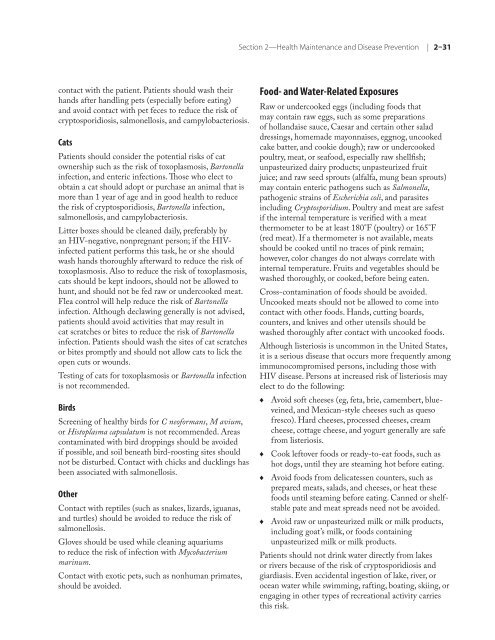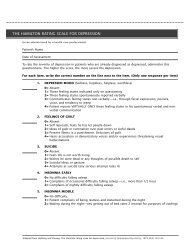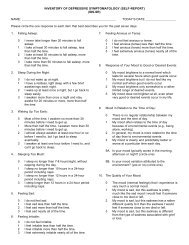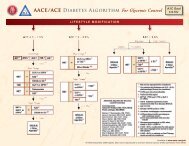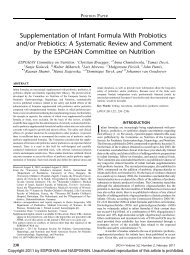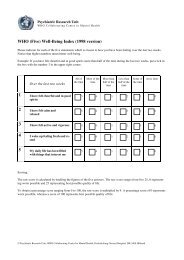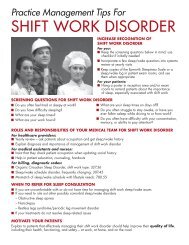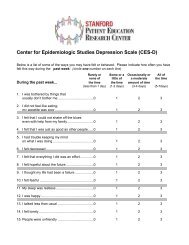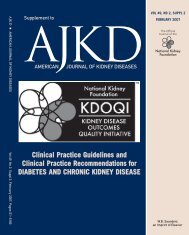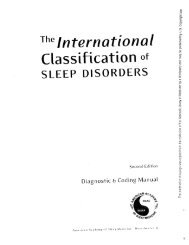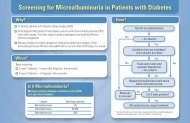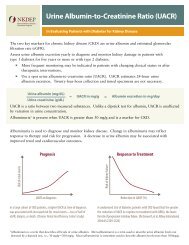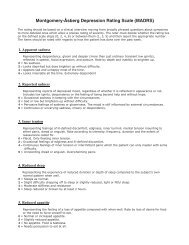Clinical Manual for Management of the HIV-Infected ... - myCME.com
Clinical Manual for Management of the HIV-Infected ... - myCME.com
Clinical Manual for Management of the HIV-Infected ... - myCME.com
You also want an ePaper? Increase the reach of your titles
YUMPU automatically turns print PDFs into web optimized ePapers that Google loves.
contact with <strong>the</strong> patient. Patients should wash <strong>the</strong>ir<br />
hands after handling pets (especially be<strong>for</strong>e eating)<br />
and avoid contact with pet feces to reduce <strong>the</strong> risk <strong>of</strong><br />
cryptosporidiosis, salmonellosis, and campylobacteriosis.<br />
Cats<br />
Patients should consider <strong>the</strong> potential risks <strong>of</strong> cat<br />
ownership such as <strong>the</strong> risk <strong>of</strong> toxoplasmosis, Bartonella<br />
infection, and enteric infections. Those who elect to<br />
obtain a cat should adopt or purchase an animal that is<br />
more than 1 year <strong>of</strong> age and in good health to reduce<br />
<strong>the</strong> risk <strong>of</strong> cryptosporidiosis, Bartonella infection,<br />
salmonellosis, and campylobacteriosis.<br />
Litter boxes should be cleaned daily, preferably by<br />
an <strong>HIV</strong>-negative, nonpregnant person; if <strong>the</strong> <strong>HIV</strong>infected<br />
patient per<strong>for</strong>ms this task, he or she should<br />
wash hands thoroughly afterward to reduce <strong>the</strong> risk <strong>of</strong><br />
toxoplasmosis. Also to reduce <strong>the</strong> risk <strong>of</strong> toxoplasmosis,<br />
cats should be kept indoors, should not be allowed to<br />
hunt, and should not be fed raw or undercooked meat.<br />
Flea control will help reduce <strong>the</strong> risk <strong>of</strong> Bartonella<br />
infection. Although declawing generally is not advised,<br />
patients should avoid activities that may result in<br />
cat scratches or bites to reduce <strong>the</strong> risk <strong>of</strong> Bartonella<br />
infection. Patients should wash <strong>the</strong> sites <strong>of</strong> cat scratches<br />
or bites promptly and should not allow cats to lick <strong>the</strong><br />
open cuts or wounds.<br />
Testing <strong>of</strong> cats <strong>for</strong> toxoplasmosis or Bartonella infection<br />
is not re<strong>com</strong>mended.<br />
Birds<br />
Screening <strong>of</strong> healthy birds <strong>for</strong> C neo<strong>for</strong>mans, M avium,<br />
or Histoplasma capsulatum is not re<strong>com</strong>mended. Areas<br />
contaminated with bird droppings should be avoided<br />
if possible, and soil beneath bird-roosting sites should<br />
not be disturbed. Contact with chicks and ducklings has<br />
been associated with salmonellosis.<br />
O<strong>the</strong>r<br />
Contact with reptiles (such as snakes, lizards, iguanas,<br />
and turtles) should be avoided to reduce <strong>the</strong> risk <strong>of</strong><br />
salmonellosis.<br />
Gloves should be used while cleaning aquariums<br />
to reduce <strong>the</strong> risk <strong>of</strong> infection with Mycobacterium<br />
marinum.<br />
Contact with exotic pets, such as nonhuman primates,<br />
should be avoided.<br />
Section 2—Health Maintenance and Disease Prevention | 2–31<br />
Food- and Water-Related Exposures<br />
Raw or undercooked eggs (including foods that<br />
may contain raw eggs, such as some preparations<br />
<strong>of</strong> hollandaise sauce, Caesar and certain o<strong>the</strong>r salad<br />
dressings, homemade mayonnaises, eggnog, uncooked<br />
cake batter, and cookie dough); raw or undercooked<br />
poultry, meat, or seafood, especially raw shellfish;<br />
unpasteurized dairy products; unpasteurized fruit<br />
juice; and raw seed sprouts (alfalfa, mung bean sprouts)<br />
may contain enteric pathogens such as Salmonella,<br />
pathogenic strains <strong>of</strong> Escherichia coli, and parasites<br />
including Cryptosporidium. Poultry and meat are safest<br />
if <strong>the</strong> internal temperature is verified with a meat<br />
<strong>the</strong>rmometer to be at least 180°F (poultry) or 165°F<br />
(red meat). If a <strong>the</strong>rmometer is not available, meats<br />
should be cooked until no traces <strong>of</strong> pink remain;<br />
however, color changes do not always correlate with<br />
internal temperature. Fruits and vegetables should be<br />
washed thoroughly, or cooked, be<strong>for</strong>e being eaten.<br />
Cross-contamination <strong>of</strong> foods should be avoided.<br />
Uncooked meats should not be allowed to <strong>com</strong>e into<br />
contact with o<strong>the</strong>r foods. Hands, cutting boards,<br />
counters, and knives and o<strong>the</strong>r utensils should be<br />
washed thoroughly after contact with uncooked foods.<br />
Although listeriosis is un<strong>com</strong>mon in <strong>the</strong> United States,<br />
it is a serious disease that occurs more frequently among<br />
immuno<strong>com</strong>promised persons, including those with<br />
<strong>HIV</strong> disease. Persons at increased risk <strong>of</strong> listeriosis may<br />
elect to do <strong>the</strong> following:<br />
♦<br />
♦<br />
♦<br />
♦<br />
Avoid s<strong>of</strong>t cheeses (eg, feta, brie, camembert, blueveined,<br />
and Mexican-style cheeses such as queso<br />
fresco). Hard cheeses, processed cheeses, cream<br />
cheese, cottage cheese, and yogurt generally are safe<br />
from listeriosis.<br />
Cook leftover foods or ready-to-eat foods, such as<br />
hot dogs, until <strong>the</strong>y are steaming hot be<strong>for</strong>e eating.<br />
Avoid foods from delicatessen counters, such as<br />
prepared meats, salads, and cheeses, or heat <strong>the</strong>se<br />
foods until steaming be<strong>for</strong>e eating. Canned or shelfstable<br />
pate and meat spreads need not be avoided.<br />
Avoid raw or unpasteurized milk or milk products,<br />
including goat’s milk, or foods containing<br />
unpasteurized milk or milk products.<br />
Patients should not drink water directly from lakes<br />
or rivers because <strong>of</strong> <strong>the</strong> risk <strong>of</strong> cryptosporidiosis and<br />
giardiasis. Even accidental ingestion <strong>of</strong> lake, river, or<br />
ocean water while swimming, rafting, boating, skiing, or<br />
engaging in o<strong>the</strong>r types <strong>of</strong> recreational activity carries<br />
this risk.


